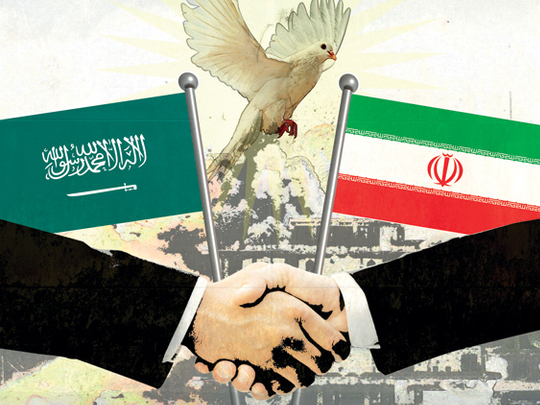
Ties between Saudi Arabia and Iran have in recent years swung to extreme ends of a pendulum. Between periods of restrained civility, there have also been times of ill-disguised hostilities. But following the belligerency of Mahmoud Ahmadinejad, the former president of Iran, whose significant contribution was economic mismanagement and verbal assaults on other countries, relations between the two countries had sunk to an all-time low.
This was further compounded by Iran’s defiant foray into its nuclear programme, with suspicions of nuclear weapons capability increasingly worrying its neighbours. The Arab Spring also expanded Iran’s regional role with its support for the government of Bashar Al Assad against the popular uprising of the Syrian masses.
There were increasing concerns that Iran’s leaders’ were openly following a path to destroy peace in the Middle East by covertly interfering into the affairs of neighbouring states not only in Syria, but in Iraq, Lebanon, Bahrain and other countries in the region. It soon became apparent and worrisome that Iran was emerging as a formidable threat to the security of regional countries. There were fears that such suspicions would drive the region to war, with the US spearheading military strikes on suspected Iranian nuclear enrichment facilities.
But following the election of a new president in Iran last year, the politics of confrontation by western powers against Iran took a dramatic new shift. Suddenly there were talks of dialogue and not war. Easing of sanctions was tabled against a nation crippled by an embargo of key goods.
Hassan Rouhani, in a complete departure from his cantankerous predecessor Ahmadinejad, portrayed a refreshingly conciliatory Iranian leadership on the world stage. At the UN General Assembly, the Iranian president thrust forward an offer of negotiations with the US and other world powers over its nuclear programme. “Our national interests make it imperative that we remove any and all reasonable concerns about Iran’s peaceful nuclear programme,” he emphasised, adding that Iran “is prepared to engage immediately in time-bound and result-oriented talks to build mutual confidence and the removal of mutual uncertainties with full transparency”.
The Saudis, who had been frustrated by the UN failure to reach consensus on a credible response on Syria in which they felt that Iran was bankrolling Al Assad, displayed their public displeasure by refusing a seat on the UN Security Council. They accused the UN Security Council of “double standards” which “prevent it from carrying out its duties and assuming its responsibilities in keeping world peace”.
Their frustrations were further enhanced by the noticeable warming of relations by western nations towards Iran, a country whose intentions they had reasons to doubt. In unprecedented moves, key figures in the Saudi government publicly displayed their displeasure and specifically with the US. Their basis was that Iran was masterminding unrest and interfering in regional countries by the fanning of sectarian violence and unrest. Relations had sunk to an all-time low.
Beneficial to cooperate
The Sunni-Shiite divide that had evolved into a significant chasm following the US invasion of Iraq began to adopt increasingly worrying overtones as lines were beginning to be drawn. From Bahrain to Iraq, Lebanon and elsewhere sectarian violence was on the rise. People who had lived amicably side by side for centuries suddenly found themselves taking up arms against each other.
In the wake of constitutional crises in several Arab countries following the Arab Spring, the Saudis emerged as a regional political heavyweight whose support to ensuring that their security was not compromised was translated into supporting their key allies including the those rebelling against the Syrian leadership.
While the Saudis had reasons to be wary of Iran, they were pragmatic enough to understand that it was more beneficial to cooperate rather than be adversaries. In May of this year, the Saudi foreign minister invited his Iranian counterpart to attend the meeting of Islamic bloc foreign ministers in Jeddah. In his invitation, Saud Al Faisal said that his counterpart had been invited to the kingdom in a bid towards better relations after three years of differences over the war in Syria. “We will talk with them in the hope that if there are any differences, they will be settled to the satisfaction of both countries,” he said.
Iran immediately welcomed the ‘friendly’ gesture, adding that an exchange of visits between key players in the two countries was high on its list of priorities. Although the visit did not take place because of the Iranian foreign ministers’ commitments to ongoing talks on Tehran’s nuclear proliferation programme, the ice may have begun to thaw.
Earlier, Iranian foreign minister Mohammad Javad Zarif said that Iran was ready to improve its relationship with Saudi Arabia, based on what he said were the two states’ common interests in the region. He stressed that relations with Saudi Arabia were ‘important’ to Iran, and that he was willing to begin dialogue with Saudi officials in which the concerns of both sides could be addressed. “We have to start from our commonalities.”
Perhaps the Israeli war on Gaza has made their differences even narrower. Both Iran and Saudi Arabia have been vocal critics of Israel’s current military onslaught against the hapless civilians in Gaza. Denouncing Israel’s brutality, the Saudi foreign minister asserted that the “barbaric Israeli forces have crossed all limits of humanity. We have seen children and infants being killed while in the arms of their mothers. The world has seen tragic images and unprecedented brutality and mass destruction in Gaza that goes beyond all limits of humanity.”
While there remain some differences between Iran and Saudi Arabia today, regional realities should encourage more cooperation between the two countries for a safer and more secure Middle East. It would be in everybody’s interest.
Tariq A. Al Maeena is a Saudi sociopolitical commentator. He lives in Jeddah, Saudi Arabia. You can follow him on Twitter at www.twitter.com/@talmaeena












